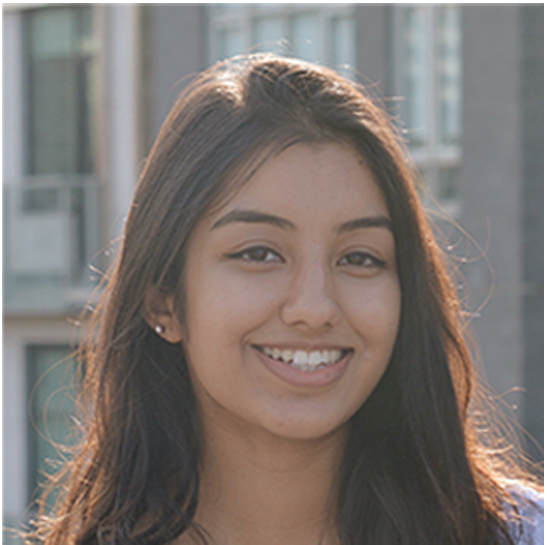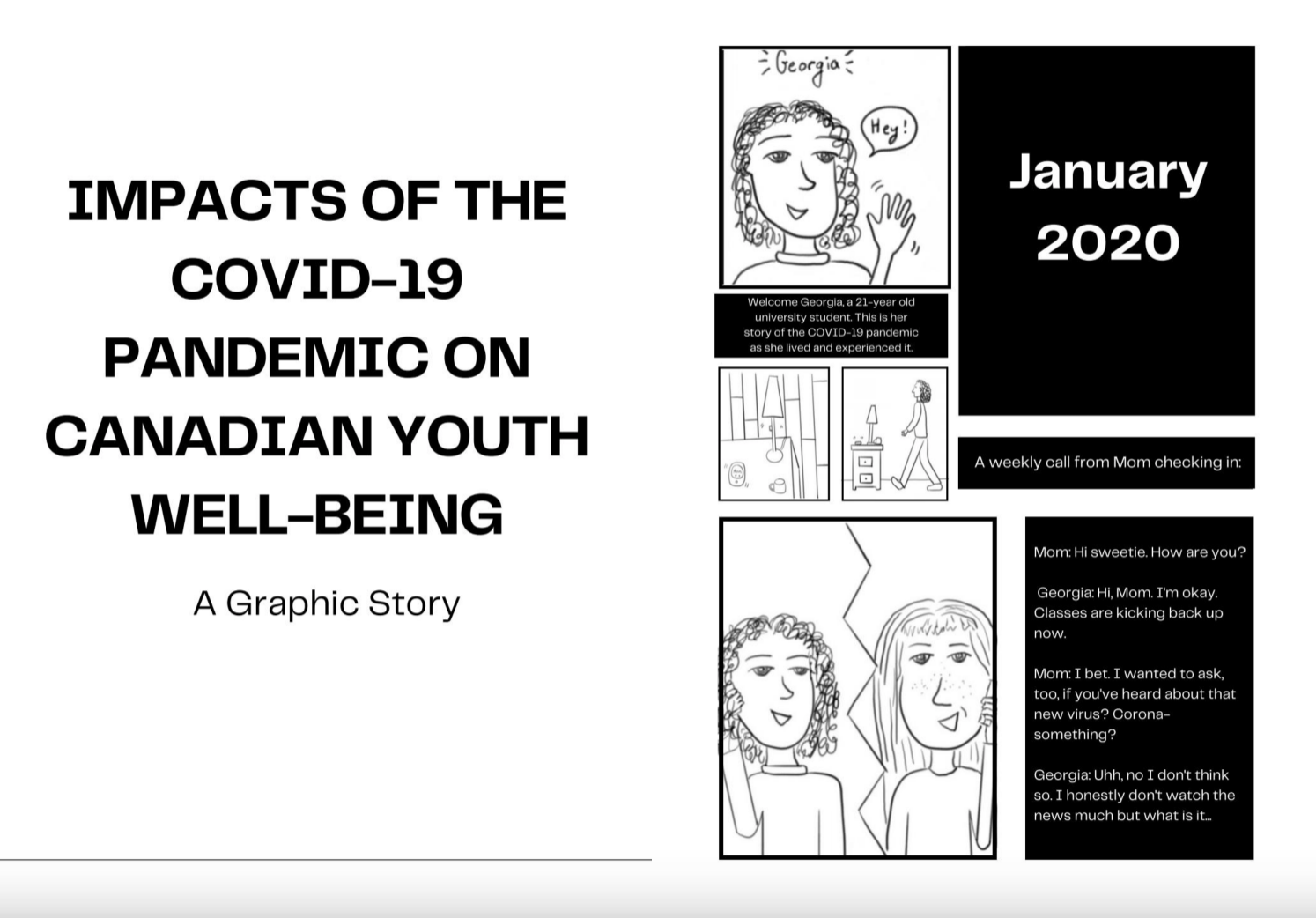2021 Summer Interns

Theo Chiara
Theo is a 4th year Political Science and Philosophy student at McGill University and is originally from Philadelphia. He is interested in researching and analyzing issues of public policy, including social injustice, which is what led him to become an intern at the Participatory Cultures Lab. In his freetime, Theo enjoys watching new movies, hiphop music, and hiking new trails.
Johnathon Cruickshank
Johnathon M. Cruickshank is a third-year student enrolled at McGill University, currently pursuing an undergraduate degree with a major in Psychology, and minors in both History and Indigenous Studies. Johnathon has been actively volunteering and engaging with disadvantaged communities here in Montréal/Tiohtià:ke throughout the COVID-19 pandemic, and is looking forward to continuing this work thanks to the opportunity provided by the Goodman Family Internship Award. As a research intern under the More Than Words project, he is excited to contribute to arts-based initiatives and other Institute for Human Development & Well-being projects in an effort to address gender-based violence and build a stronger community.
🤔 Jonathon's reflections on the internship experience 🤔
Johnathon Cruickshank
Working at More Than Words, and its sister project Networks for Change, over the past few months has been a truly affecting and illuminating experience. I was first drawn to the internship after coming across an excerpt of researcher Eve Tuck’s publication concerning “damage-centered” narratives in Indigenous-focused research on the More Than Words website. After working on the project for only a short amount of time, I knew that everyone involved not only held the principles of positive, non-exploitative, and community-focused research in the highest regard, but practiced these principles as well. This was beyond encouraging considering the historically uneasy relationship between research and Indigenous communities. I was also taken by the arts-based approach that emphasized how youth could not just be a part of the project, but be leaders within it.
Decolonizing methodologies are sure to play an important role in both my personal and professional perspectives as I move forward into my career. My time at the Participatory Cultures Lab has taught me so much about the world of decolonizing research and, most critically, has educated me substantially on how to engage with Indigenous and other marginalized communities respectfully and mindfully in ways that benefit the communities themselves, by far the most indispensable part of the process. In the future, I hope to work in the legal profession, whether it be further work in research or actual litigation. In particular, focusing on Indigenous rights and sovereignty issues as they pertain to the Canadian legal paradigm. The knowledge I have gained thanks to my time with the More Than Words project will continue to shape and inform my efforts to decolonize my mindset and fight for Indigenous rights alongside communities.
Oftentimes, whether it be in our academic disciplines or simply our daily lives, we are asked to stop and reflect on what it means to live in and benefit from systems of settler colonialism. In these reflections, we can look to the future and imagine a world in which we are all able to enact meaningful change in the lives of those who are marginalized by these systems. At More Than Words, I feel we are given a glimpse of what this future looks like. No longer will young women and girls be pushed aside. The future is girl-led. The future respects Indigenous sovereignty and authority. The future includes and benefits all. I am grateful to have been a part of a project that understands and advocates this.
Saruul Khishigjargal
Saruul Khishigjargal is a U3 student pursuing an honours degree in International Development with a minor in Social Entrepreneurship at McGill University. Passionate about grassroots development, monitoring and evaluations, and social enterprise as a sustainable economic strategy, she is an Integrated Managements Student Fellow at the Marcel Desautels Institute. Through her internship at More than Words, Saruul is excited to learn about participatory arts-based research methodologies, develop visual and innovative toolkits to communicate research data, and participate in creative community engagement projects. She is particularly interested in understanding how Indigenous women and youth address experiences with gender-based violence and find empowerment through creative collective action.
Tatianna Sitounis
Tatianna Sitounis is currently a U3 student at McGill University, pursuing a major in Environment and Development, and minoring in Health Geography. Her academic pursuits highlight her passions surrounding environmental and social justice, as well as human health and community well-being. Having a deep passion for art and community involvement, Tatianna has diverse experience working in research, painting murals, volunteering with nonprofit organizations, and serving as the Sustainability Officer for the McGill Undergraduate Geography Society. She looks forward to combining her passions of social justice, research, and community engagement with her love for art and digital media as a summer intern with the Participatory Cultures Lab.
🤔 Tatiana's reflections on the internship experience 🤔
I want to start by saying how grateful I am to have had the opportunity to work with the team at the Participatory Cultures Lab this summer. Beginning this internship, I was very excited, nervous, and eager to learn what arts-based participatory research is like and what it entails. Reflecting on my time as an intern here, I realize how trying to find a generalizable way of explaining this work is just as difficult as it was when I hadn’t had any experience. This is because each project is so unique, so diverse, and so important within the context of the group or peoples in which it relates to. It has been hard to explain to family and friends in a few sentences what it is exactly that I am doing, because the work, like the projects and people involved, is diverse and extensive, yet always culminates in such a beautiful, organized, and impactful way.
I think this idea of a somewhat indefinable quality to the work relates heavily to its significance in decolonizing research. There is a certain colonial characteristic that lies in labeling, definitions, and a need to box things into their appropriate categories to suppress difference. My experience with the PCL, however, has taught me there is indeed space for creativity, art, and diverse human identities within academic-level research, which to me, goes against these aspects of colonialism that still try to adhere to strict binaries and generalizations of peoples. Furthermore, as a university student, the way to conduct research was always presented in such rigid terms, which I found very unappealing and intimidating, as I didn’t feel like I belonged in that specific definition of what it means to do good research and be an academic. However, from experiencing the ICF and attending the first ever ICF Symposium to doing graphic notetaking for the N4C Imbizo Event, my perception on what it means to do research has completely changed for the better. Not only have I experienced first-hand what it means to conduct arts-based participatory research, but I have also discovered its importance and resonance beyond all the hard work that goes into it. I feel that the work I got to do with the PCL, and the work I saw from my fellow colleagues, included some of the most innovative, inspiring, and impactful methodologies and final products I have seen.
As I prepare to graduate this Fall, I honestly don’t have any concrete plan of what my next step will be, but I do know that this internship experience has significantly solidified my own ideals for the type of work I aspire to do and be involved in. I remember seeing the PCL internship posting on the AIO website and feeling an overwhelming sense of excitement for the crazy culmination of all my interests in one package, and also a deep sense of hope, as seeing the existence of a group like the PCL and all its branches gave me such joy in knowing that this work does exist. The flexible artistic approach to these participatory methods reflects what it means to be human, which is not something that is rigid or definable.
I will forever be grateful for this experience, and I look forward to the future of the PCL, to the future of further decolonizing research, and where I’ll find myself in the coming years.

Catherine Dillman
Hello, my name is Catherine Dillman and I am a third-year Honours Geography student with a minor in Environmental Studies. During my time at McGill, I have been heavily involved in IRSAM through our Delegation Team and the Model UN conferences McGill hosts, as well as VP Marketing of The Pit comedy group. Through growing up moving internationally, I have a large interest in foreign affairs and how to provide aid in bottom-up approaches, and I am incredibly excited about the work that is being done through this research.
🤔 Catherine's reflections on the internship experience 🤔
After working with Networks for Change and Well-Being over the summer I have found that this work has introduced a new lens into how I unpack research, activism, as well as ground-up policy work. Working with the incredible women and girls from both South Africa and Indigenous communities in Canada was able to provide a personal perspective into the impacts of colonization and gender-based violence. So much of the time when colonization is spoken about it is paired with the broader perspective and blurs together all lived experiences, taking away from the individual history and present experience. Working with Networks for Change was able to have a two-pronged approach that addressed both the larger picture and the connectedness of the issue in how it related to gender inequities, but as well the specific impacts on the communities we had the privilege to work with. I believe this combination between large and small scale is an aspect that should be transferred into decolonizing methods more broadly.
Moreover, the participatory methods and approaches used in the arts-based initiatives created a more accessible platform allowing for everyone to participate regardless of age and ability. When looking at other studies and work, a lot of the time the methods focus more on empirical data and policies, which can reduce the accessibility of the study being done. However, Networks for Change was able to have arts-based initiatives that were able to not only collect profound material, but connect communities that have similar lived experiences and aid in the empowerment of women and girls. Through having a continuous effort to empower women and allow them to lead, the work being done has immediate positive impacts on the communities, which is substantial as so many policies passed have delays in their benefits. This idea is incredibly valuable to translate over into future work and studies, both in terms of accessibility and timeline of impact. In future work, I believe this combination between arts-based initiatives and collection of data will allow for high accessibility and an ability to work with a younger population and tackle complex issues in a manner where the information is easily digestible for the participants involved.
Beyond the skills I gained from working with Networks for Change, I found the perspective it provided me with will benefit my future studies and work. In future studies the constant application of how to aid in decolonization, as an integral part of the study and not as an afterthought is essential. As well, when conducting a study, ensuring that the participants are leading the initiatives and having myself be the foundation of the project, leading from behind to allow for their voices and perspective to sculpt the work. I more than value my experience with Networks for Change and for all of the incredible people I was able to meet and have the privilege to work with, as well as the valuable skills I was able to gain and the ability to expand my perspective in both work and life.
Sumaya Soufi
“Hi everyone! I’m Sumaya, and I will be joining the team this summer as an undergraduate Global Health Scholar. When I first heard about the PCL, and more specifically about Networks for Change and Well-being, I was quite fascinated with the work being done through the means of “visual participatory exploration” and how such methods can facilitate a personal restorative process for girls that have been subject to sexual abuse. With a background in similar approaches—however, used in the context of cultural revitalization within the Edmonton Somali community—I have been interested in this area of participatory visual-based research in the general sense for some time. My engagement in global health has been largely focused on methods of increasing the access of historically marginalized communities to more culturally-specific and sensitive resources. I am very excited to work with the PCL on the final phase of the Networks for Change and Well-being program to help ensure we provide a platform for these girls to be properly celebrated, and to help amplify the stories and projects that have been shared during these past 7 years. I look forward to meeting you all soon and collaborating this summer!”

Elina Qureshi
Elina Qureshi is a U3 student pursuing a Bachelor of Arts in International Development and Economics. Her academic interests include public policy and good governance, international environmental policy, and transnational migration. Her previous work experience has focused on corruption, transparency, and governance practices in Lebanon, immigration and refugee policy in Canada, and financial empowerment through development programming for women in Uganda. She has participated in various on-campus student organizations and is on the editorial board for journals such as Catalyst and Maktoub. Elina is passionate about furthering equity and sustainability through her work and is looking forward to contributing towards community development initiatives at the IHDW and learning more about participatory visual research.
Ishika Obeegadoo
My name is Ishika Obeegadoo and I am going into my final year at McGill to complete my Bachelor of Arts and Science in Cognitive Science with a minor in Economics. I was born in the Indian Ocean island of Mauritius and grew up there before emigrating to Canada. I am passionate about Human Development with particular reference to gender equality and universal access to health and education. This summer, I look forward to exploring the role that governance and policy-making can play in fostering sustainable and equitable human development and ensuring the well-being of at-risk populations and marginalized groups.
-

9th Annual McGill Cellphilm Festival Transformation
This year’s festival centered on the theme of Transformation. Transformation has been a pivotal force shaping human experience throughout history as our world has undergone unique and influential transformations across the fields of education, health, art, technology, and beyond. Around the globe, we have learned to adapt individually and collectively to our circumstances, as well as pilot transformations of our own, bringing new perspectives and ways of living to our loved ones and wider communities. Participants were encouraged to focus their cellphilm development around a driving question: What does Transformation mean to you and in your circumstances whether it is school, community, environment or everyday life?
⇒ Link to the Festival's Webpage
Read the festival report that details the outcomes with reflections on the evolution of the cellphilms prepared by Theo Chiara and Tatianna Sitounis
[All Streams]
-

IHDW Newsletter
prepared by Elina Qureshi
[All Streams]
-

Briefing Paper on Covid and Youth
prepared by Theo Chiara and Tatianna Sitounis
[Stream: PCL]
-

Publication on Covid and Youth
A self-driven project by Tatianna Sitounis
This project is born out of a literature review that began over three months ago at the Participatory Cultures Lab (PCL) of McGill University. Researching and compiling news reports on the impact on well-being for Canadian young people for a briefing report, I wanted to include a more accessible output that reflected much of what was expressed by the young people interviewed in many of the articles. This graphic story follows a fictional documentation of a recently graduated female university student who is navigating her own life during the pandemic. Here, I want to acknowledge that the experience of this character was written largely through my own identity, influenced by the stories of my friends, and inspired by all the research from the literature review. In this way, the identity of the main character may not resonate with everyone else's lived experience, nor should it, but I hope that the emotional journey documented will be something that each reader can relate to in their own way link: https://www.mcgill.ca/ihdw/files/ihdw/tatianna_sitounis_graphic_booklet_0.pdf
[Stream: PCL]
-

Cross Cutting - Social Media
coming Soon
[MTW/Networks]
-

PREAM Webinars and Training Sessions
Desscription coming soon















